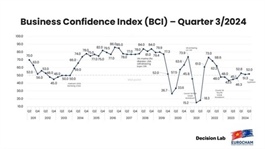European businesses maintain positive sentiment for Vietnam
European businesses maintain positive sentiment for Vietnam
European businesses maintain a positive sentiment about Vietnam despite the economic challenges posed by Typhoon Yagi, according to EuroCham Vietnam's latest findings.

EuroCham Vietnam released its Q3/2024 Business Confidence Index (BCI) report on October 8. The BCI score saw a notable increase, rising from 45.1 points in Q3/2023 to 52 points this quarter, signalling a strong on-year recovery despite tough external conditions. EuroCham’s BCI survey gathered and analysed insights from the chamber’s network of 1,400 members.
The damage caused by Typhoon Yagi, which has severely impacted infrastructure and agricultural sectors in northern Vietnam, has led the Vietnamese government to forecast a 0.15 per cent reduction in GDP for 2024, with estimated losses reaching $1.63 billion. Yet EuroCham’s latest survey, conducted after the typhoon from September 12-25, shows that nearly half (47.4 per cent) of respondents are confident their companies will see improvement in the coming quarter. Additionally, long-term optimism remains high, with 69.3 per cent expecting a favourable business climate over the next five years.
This positive outlook is further reinforced by Vietnam’s continued appeal as an investment destination, with 67 per cent of European businesses still recommending the country despite ongoing challenges.
“Despite the recent economic strain caused by Typhoon Yagi, the resilience and adaptability of both the Vietnamese economy and European businesses operating here are evident in this latest survey. These results are not just numbers; they tell a story of Vietnam’s evolving role as a strategic business hub,” said Bruno Jaspaert, chairman of EuroCham Vietnam.
Following the new decree on the mechanism for direct power purchase agreements (DPPA) issued in July this year, nearly 30 per cent of respondents expect to benefit from renewable energy projects, further solidifying Vietnam’s commitment to a green transition. One in four service providers and companies with 100 or more employees anticipate the DPPA will benefit them moderately or significantly. While approximately half (47.4 per cent) of surveyed businesses are confident in their ability to fully transition to renewable energy by 2050, gaps remain in policy understanding and implementation.
Digitalisation was also identified as a critical area for improvement, particularly in alleviating human resource constraints and streamlining administrative processes. The BCI survey revealed a moderate rate of AI/ML adoption, with 46.1 per cent of companies reporting to have adopted AI/ML in their operations. However, most adoption remains in the early stages, pointing to substantial opportunities for investment in digitalisation projects.
In addition to digitalisation, businesses are adapting their travel strategies in response to rising airfares. Over 40 per cent of respondents reported becoming more selective with their business trips or opting for alternative transportation due to high travel costs, while some have reduced or cancelled travel plans altogether.



























